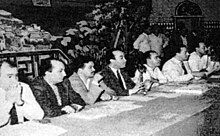National Union of Popular Forces
This article includes a list of general references, but it lacks sufficient corresponding inline citations. (June 2017) |
National Union of Popular Forces Union Nationale des Forces Populaires | |
|---|---|
Arab Socialism | |
| Political position | Left-wing |
The National Union of Popular Forces (
Espousing
, possibly on Oufkir's orders, in a case that remains a powerful if hotly debated symbol of the democratic struggle in Morocco.
 |
|---|
| Judiciary |
|
|
The UNFP later broke apart again, with one wing restyling itself the Socialist Union of Popular Forces (Union Socialiste des Forces Populaires, USFP), which survives still today as a centre-left party. In the elections of 1993 USFP and Istiqlal worked together and were both opposition parties. Since 1998, the USFP is the main coalition party of the "Alternance government".
Abderrahmane Youssoufi, one of the founders of the UNFP, and later the chairman of the USFP, who was once a political prisoner and condemned to death, in 1998 became head of government through elections. This — one of the first cases in modern Arab history of a head of government being selected from among the opposition — was viewed as a major breakthrough for Morocco's reform process.
A small group led by Abdallah Ibrahim maintained the UNFP denomination until his death in 2005; it boycotted all elections since 1972.
Offshoots
Tanzim was a radical branch of the National Union of Popular Forces party, with a revolutionary tendency. Tanzim was created in 1969-1970, with an influence from the Palestinian resistance and a support from many Panarabist republican regimes (Syria, Algeria, Libya).[2]
